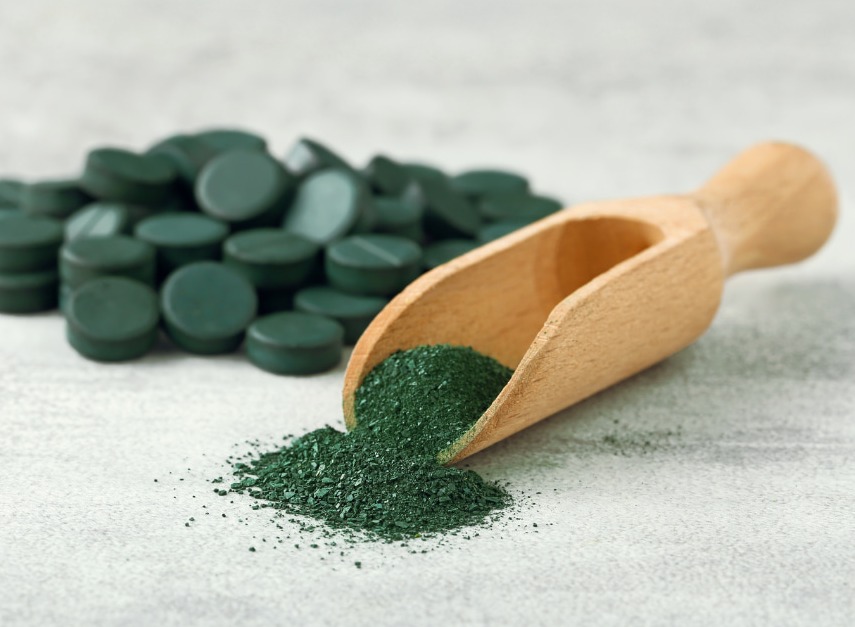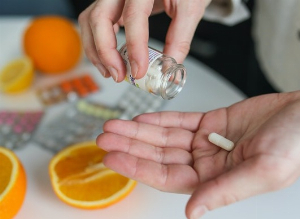What are the benefits of spirulina?
Published 24 Feb 2024 • By Claudia Lima
Spirulina is a real superstar in the world of nutrition. It has become extremely popular due to its exceptional health benefits, both for the body and mind.
So what are the nutritional properties of spirulina? In what way can it be beneficial to our health? Are there any precautions you need to take?
Find all the answers in our article!

What is spirulina?
Spirulina has long been a traditional food in Aztec culture and in Chad. It was rediscovered by Europeans in the 1970s.
Often misleadingly referred to as a blue or blue-green micro-algae, spirulina is in fact a microscopic cyanobacterium in the shape of a spiral, hence its name. Cyanobacteria are photosynthetic bacteria that form a phylum. There are 36 species of edible spirulina, but the most widely cultivated and sold is Arthrospira platensis.
Spirulina's colour is due to its high concentration in phycocyanin, a blue pigment. It has no cellulose wall, the extracellular matrix that protects most plant cells. This means that its contents are more accessible to digestive enzymes, making its assimilation by the body much easier, and its active ingredients are highly bioavailable.
The exact composition of spirulina may vary slightly depending on growing conditions, the environment and harvesting methods. Spirulina is made up of:
- Proteins,
- Lipids, including fatty acids,
- Carbohydrates,
- Fibre,
- Vitamins: A (beta-carotene), B, D, E and K,
- Minerals: iron, calcium, magnesium, phosphorus, potassium, sodium, zinc, copper, manganese, chromium, selenium,
- Antioxidants: chlorophyll, carotenoids and phycocyanine,
- Other nutrients: amino acids, enzymes, essential fatty acids (omega 6 and gamma-linolenic acid), polysaccharides, etc.
Because of this nutrient-rich composition, spirulina is considered a superfood.
Spirulina has become very popular due to its numerous health benefits, and is sold by manufacturers in liquid, powder, capsule or tablet form. It can also be found in more traditional forms and in the form of derived food products (pasta). It is also widely used in spas and beauty salons for masks and other beauty treatments.
What benefits does spirulina offer for our health?
Spirulina has many exceptional properties and can improve various aspects of your health. Thus, it:
Makes you feel less tired
Spirulina helps reduce fatigue linked to a lack of iron intake or poor iron absorption. The amino acid content of spirulina is thought to improve the absorption of nutrients, resulting in better energy and vitality.
Increases your endurance and resistance to effort
Spirulina is rich in beta-carotene, which promotes oxygenation of the body, so its antioxidants help improve endurance.
Takes care of your heart
Spirulina is said to help increase HDL cholesterol (good cholesterol) and reduce LDL cholesterol (bad cholesterol) and triglycerides. This, together with its essential fatty acid content, has a positive impact on cardiovascular health.
Strengthens your immune system
Spirulina has an immunostimulant property, helping strengthen your immune system by neutralising free radicals, reducing the risk of disease and boosting your natural defences and resistance to infection.
Reduces oxydative stress
Oxidative stress is responsible for premature ageing of all the body's cells. Spirulina and its antioxidants help protect cells against its harmful effects.
Eliminates toxins
Spirulina is thought to help eliminate heavy metals and toxins from your body, thereby supporting liver function. Spirulina could play a role in protecting and supporting the liver.
Helps you control your weight better
Spirulina has no direct effect on weight loss, but because of its high protein content, it can contribute to a feeling of satiety, which is beneficial for weight control.
Improves the health of your hair and skin
Thanks to its protein, iron and copper content, spirulina nourishes your hair, improving its growth and preventing premature ageing. As far as your skin is concerned, spirulina is an anti-ageing ally, since it slows down the appearance of wrinkles and preserves the skin's elasticity thanks to collagen synthesis promoted by amino acids.
There are also many misconceptions about the benefits of spirulina. For example, vegans may think spirulina is a source of vitamin B12, whereas most of the vitamin B12 contained in spirulina is inactive. Spirulina is also highly praised by sports enthusiasts, due to the virtues attributed to it by some online shops, but spirulina alone is not enough to build muscle mass.
What should you be aware of when taking spirulina?
Spirulina is one of the most popular food supplements sold in shops and online.
However, it has its side effects, which can include intestinal problems (nausea, cramps, bloating, diarrhoea) and headaches, quite common if the doses are not respected. In addition, spirulina can increase the effects of anti-coagulant and hypoglycaemic treatments. You should talk to your doctor before taking spirulina.
Spirulina is contraindicated for people with allergies and for those suffering with phenylketonuria (a hereditary genetic disease) due to its phenylalanine content, an amino acid that is toxic to the brain.
It is recommended to buy a good-quality spirulina food supplement issued from a clearly identified manufacturer, and not the first thing found on the Internet.
Conclusion
Spirulina, with its many health benefits, has become a popular superfood. Whether it's to strengthen your immune system, boost your energy or support your cardiovascular health, spirulina offers a natural solution to many health and well-being related issues.
However, it is important to remember that spirulina is still a food supplement.
Your health and well-being are both the result of a combination of factors, ranging from a well-balanced diet to regular exercise and effective stress management. Spirulina, as a dietary supplement, can be a powerful addition to, but by no means a substitute for, a healthy lifestyle.
As a reminder, you should always talk to a healthcare professional before making any changes to your diet, especially if you have a chronic condition.
Take care!
Sources :
Compléments alimentaires : les dangers de la spiruline, quechoisir.org
Privilégier les circuits d'approvisionnement les mieux contrôlés, anses.fr
Spiruline : quels bienfaits, sante.journaldesfemmes.fr
Quels sont les bienfaits de la spiruline sur la santé ?
Spiruline : composition et intérêts nutritionnels, entre vertu et marketing, irbms.com

 Facebook
Facebook Twitter
Twitter



